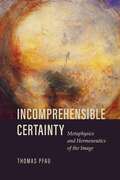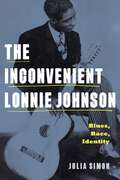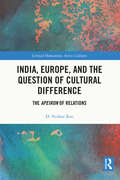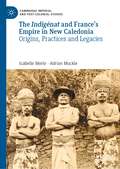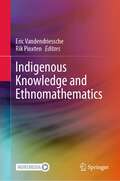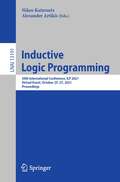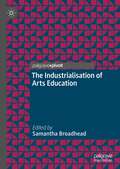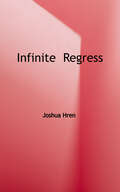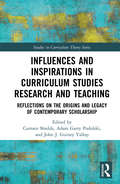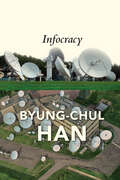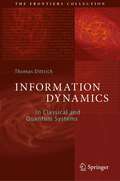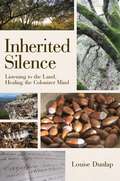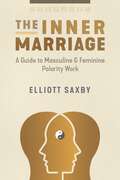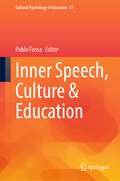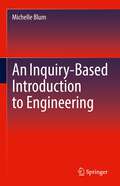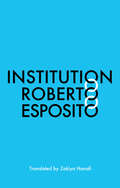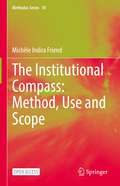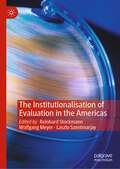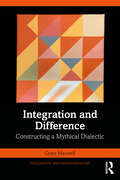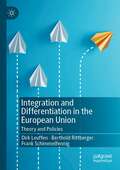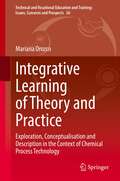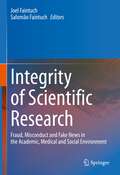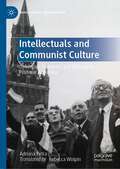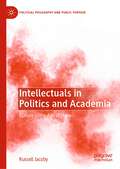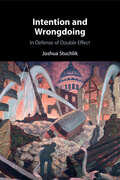- Table View
- List View
Incomprehensible Certainty: Metaphysics and Hermeneutics of the Image
by Thomas PfauThomas Pfau’s study of images and visual experience is a tour de force linking Platonic metaphysics to modern phenomenology and probing literary, philosophical, and theological accounts of visual experience from Plato to Rilke. <p><p> Incomprehensible Certainty presents a sustained reflection on the nature of images and the phenomenology of visual experience. Taking the “image” (eikōn) as the essential medium of art and literature and as foundational for the intuitive ways in which we make contact with our “lifeworld,” Thomas Pfau draws in equal measure on Platonic metaphysics and modern phenomenology to advance a series of interlocking claims. <p><p>First, Pfau shows that, beginning with Plato’s later dialogues, being and appearance came to be understood as ontologically distinct from (but no longer opposed to) one another. Second, in contrast to the idol that is typically gazed at and visually consumed as an object of desire, this study positions the image as a medium whose intrinsic abundance and excess reveal to us its metaphysical function―namely, as the visible analogue of an invisible, numinous reality. Finally, the interpretations unfolded in this book (from Plato, Plotinus, Pseudo-Dionysius, John Damascene via Bernard of Clairvaux, Bonaventure, Julian of Norwich, and Nicholas of Cusa to modern writers and artists such as Goethe, Ruskin, Turner, Hopkins, Cézanne, and Rilke) affirm the essential complementarity of image and word, visual intuition and hermeneutic practice, in theology, philosophy, and literature. <p><p>Like Pfau’s previous book, Minding the Modern, Incomprehensible Certainty is a major work. With over fifty illustrations, the book will interest students and scholars of philosophy, theology, literature, and art history.
The Inconvenient Lonnie Johnson: Blues, Race, Identity (American Music History)
by Julia SimonLonnie Johnson is a blues legend. His virtuosity on the blues guitar is second to none, and his influence on artists from T-Bone Walker and B. B. King to Eric Clapton is well established. Yet Johnson mastered multiple instruments. He recorded with jazz icons such as Duke Ellington and Louis Armstrong, and he played vaudeville music, ballads, and popular songs.In this book, Julia Simon takes a closer look at Johnson’s musical legacy. Considering the full body of his work, Simon presents detailed analyses of Johnson’s music—his lyrics, technique, and styles—with particular attention to its sociohistorical context. Born in 1894 in New Orleans, Johnson's early experiences were shaped by French colonial understandings of race that challenge the Black-white binary. His performances call into question not only conventional understandings of race but also fixed notions of identity. Johnson was able to cross generic, stylistic, and other boundaries almost effortlessly, displaying astonishing adaptability across a corpus of music produced over six decades. Simon introduces us to a musical innovator and a performer keenly aware of his audience and the social categories of race, class, and gender that conditioned the music of his time. Lonnie Johnson’s music challenges us to think about not only what we recognize and value in “the blues” but also what we leave unexamined, cannot account for, or choose not to hear. The Inconvenient Lonnie Johnson provides a reassessment of Johnson’s musical legacy and complicates basic assumptions about the blues, its production, and its reception.
India, Europe and the Question of Cultural Difference: The Apeiron of Relations (Critical Humanities Across Cultures)
by D. Venkat RaoThis volume critically engages with the question of cultural difference and the idea of living with diversity in the context of India and Europe. It looks at certain essential European categories of learning such as art, nature, human, literature, relation, philosophy, and the humanities and analyses texts from Sanskrit language (through Telugu resources) to argue that categories like prakriti, loka, jati, dharma, karma, sahitya, kala,etc. cannot be conflated with conceptual formations such as nature, world, caste, religion, (sanctioned) action, literature and art respectively. The book questions and unravels the efficacy of European concepts, theories and interpretive frames in understanding Indian reflective traditions and cultural forms. It also lays the groundwork for reorienting teaching and research in universities in the humanities on the basis of key cultural differences. By focusing on major themes in the humanities discourse and their limitations, the work engages with the writings of Heidegger, Derrida and Agamben, among others, from radically new vantage points of Sanskrit-Indian reflective traditions, and challenges prevailing ideas about Indian art, literature and culture. Part of the Critical Humanities Across Cultures series, this book will be an essential read for scholars and researchers of Indian languages and literature, comparative literature, art and aesthetics, postcolonial studies, cultural and heritage studies, philosophy, political philosophy, comparative philosophy, Sanskrit studies, India studies, South Asian studies, Global South studies, and for those working on education in the humanities/human sciences.
The Indigénat and France’s Empire in New Caledonia: Origins, Practices and Legacies (Cambridge Imperial and Post-Colonial Studies)
by Isabelle Merle Adrian MuckleThis book provides a long history of France’s infamous indigénat regime, from its origins in Algeria to its contested practices and legacies in France’s South Pacific territory of New Caledonia. The term indigénat is synonymous throughout the francophone world with the rigours and injustices of the colonial era under French rule. The indigénat regime or 'Native Code' governed the lives of peoples classified as French 'native' subjects in colonies as diverse as Algeria, West Africa, Madagascar, Indochina and New Caledonia. In New Caledonia it was introduced by decree in 1887 and remained in force until Kanak — New Caledonia’s indigenous people — obtained citizenship in 1946. Among the colonial tools and legal mechanisms associated with France’s colonial empire it is the one that has had the greatest impact on the memory of the colonized. Focussing on New Caledonia, the last remaining part of overseas France to have experienced the full force of the indigénat, this book illustrates the way that certain measures were translated into colonial practices, and sheds light on the tensions involved in the making of France as both a nation and a colonial empire. The first book to provide a comprehensive history of the indigénat regime, explaining how it first came into being and survived up until 1946 despite its constant denunciation, this is an important contribution to French Imperial History and Pacific History.
Indigenous Knowledge and Ethnomathematics
by Eric Vandendriessche Rik PinxtenThe book presents a series of ethnographic studies, which illustrate issues of wider importance, such as the role of cultural traditions, concepts and learning procedures in the development of formal (or mathematical) thinking outside of the western tradition. It focuses on research at the crossroads of anthropology and ethnomathematics to document indigenous mathematical knowledge and its inclusion in specific cultural patterns. More generally, the book demonstrates the heuristic value of crossing ethnographical, anthropological and ethnomathematical approaches to highlight and analyze—or "formalize" with a pedagogical outlook—indigenous mathematical knowledge.The book is divided into three parts. The first part extensively analyzes theoretical claims using particular ethnographic data, while revealing the structural mathematical features of different ludic, graphic, or technical/procedural practices in their links to other cultural phenomena. In the second part, new empirical studies that add data and perspectives from the body of studies on indigenous knowledge systems to the ongoing discussions in mathematics education in and for diverse cultural traditions are presented. This part considers, on the one hand, the Brazilian work in this field; on the other hand, it brings ethnographic innovation from other parts of the world. The third part comprises a broad philosophical discussion of the impact of intuitive or "ontological" premises on mathematical thinking and education in the light of recent developments within so-called indigenously inspired thinking. Finally, the editors’ conclusions aim to invite the broad and diversified field of scholars in this domain of research to seek alternative approaches for understanding mathematical reasoning and the adjacent adequate educational goals and means.This book is of interest to scholars and students in anthropology, ethnomathematics, history and philosophy of science, mathematics, and mathematics education, as well as other individuals interested in these topics.
Inductive Logic Programming: 30th International Conference, ILP 2021, Virtual Event, October 25–27, 2021, Proceedings (Lecture Notes in Computer Science #13191)
by Nikos Katzouris Alexander ArtikisThis book constitutes the refereed conference proceedings of the 30th International Conference on Inductive Logic Programming, ILP 2032, held in October 2021. Due to COVID-19 pandemic the conference was held virtually. The 16 papers and 3 short papers presented were carefully reviewed and selected from 19 submissions. Inductive Logic Programming (ILP) is a subfield of machine learning, which originally relied on logic programming as a uniform representation language for expressing examples, background knowledge and hypotheses. Due to its strong representation formalism, based on first-order logic, ILP provides an excellent means for multi-relational learning and data mining, and more generally for learning from structured data.
The Industrialisation of Arts Education
by Samantha BroadheadThis book comprises the responses of a group of multi-disciplinary writers/ researchers/practitioners to the proposition that arts education in the twentyfirst century has become industrialised. Historical and contemporary examples of how arts education prepares students for working in industry are discussed to show how the expectations of educators, students and industry representatives do not always concur. The extent to which arts pedagogies have been informed by the agendas of the cultural industries as well as wider neoliberal ideologies are also considered. This leads to questions about the function and value of arts education. The debates expose tensions of producing students who are ‘industryready’ in an educational context that must, at the same time, consider other issues such as sustainability and widening participation. Writers, educators and researchers in vocational education, creative writing, jewellery design, animation, fashion branding and popular music investigate the complexities relating to this topic from their own diverse points of view.
Infinite Regress
by Joshua HrenIn the years since his graduation from St. Marquis University, Blake Yourrick has fled his family and Milwaukee, rotating from job to dead-end job-working the Bakken oilfields in Dakota and even signing on as the night caretaker of a rural abbey graveyard. Deep in student debt and estranged from his misanthropic, alcoholic father, Blake is haunted by the memory of his mother's death-and by his relationship with his college mentor, a defrocked priest named Theo Hape, who is known for his adventurous theological ideas as well as for the uncanny , seductive power he wields over his students. When Hape, learning of his former charge's desperate straits, proposes a perverse exchange of services, Blake finds himself tempted to test the professor's radical theories in real life. What follows is a metaphysical duel reminiscent of the novels of Dostoevsky and Bernanos, pitting a modern-day anti-Christ against a reckless but resilient young man and his well-meaning, dysfunctional kin.
Influences and Inspirations in Curriculum Studies Research and Teaching: Reflections on the Origins and Legacy of Contemporary Scholarship (Studies in Curriculum Theory Series)
by Carmen Shields Adam Garry Podolski John J. Guiney YallopThis volume highlights lived experiences, personal inspirations and motivations, which have generated scholarship, and influenced the research and teaching of scholars in the field of curriculum studies. Offering contributions from new, established and experienced scholars, chapters foreground the ways in which the authors have been influenced by the mentorship and work of others, by personal challenges, and by the contexts in which they live and work. Chapters also illustrate how scholars have engaged in variety of methodological and autobiographical processes including narrative and poetic inquiry, autoethnography and visual arts research. Through a range of contributions, the book clarifies the origins and legacy of contemporary curriculum studies and in doing so, provides inspiration for beginning scholars and academics as they continue to find their voices in academic communities. Offering rich insight into the experiences and scholarship of a wide range of scholars, this volume will be of interest to students, scholars and researchers with an interest in curriculum studies, as well as educational research and methodologies more broadly.
Infocracy: Digitization and the Crisis of Democracy
by Byung-Chul HanThe tsunami of information unleashed by digitization is threatening to overwhelm us, drowning us in a sea of frenzied communication and disrupting many spheres of social life, including politics. Election campaigns are now being waged as information wars with bots and troll armies, and democracy is degenerating into infocracy. In this new book, Byung-Chul Han argues that infocracy is the new form of rule characteristic of contemporary information capitalism. Whereas the disciplinary regime of industrial capitalism worked with compulsion and repression, this new information regime exploits freedom instead of repressing it. Surveillance and punishment give way to motivation and optimization: we imagine that we are free, but in reality our entire lives are recorded so that our behaviour might be psychopolitically controlled. Under the neoliberal information regime, mechanisms of power function not because people are aware of the fact of constant surveillance but because they perceive themselves to be free. This trenchant critique of politics in the information age will be of great interest to students and scholars in the humanities and social sciences and to anyone concerned about the fate of politics in our time.
Information Dynamics: In Classical and Quantum Systems (The Frontiers Collection)
by Thomas DittrichThis wide-ranging book introduces information as a key concept not only in physics, from quantum mechanics to thermodynamics, but also in the neighboring sciences and in the humanities. The central part analyzes dynamical processes as manifestations of information flows between microscopic and macroscopic scales and between systems and their environment. Quantum mechanics is interpreted as a reconstruction of mechanics based on fundamental limitations of information processing on the smallest scales. These become particularly manifest in quantum chaos and in quantum computing. Covering subjects such as causality, prediction, undecidability, chaos, and quantum randomness, the book also provides an information-theoretical view of predictability. More than 180 illustrations visualize the concepts and arguments. The book takes inspiration from the author's graduate-level topical lecture but is also well suited for undergraduate studies and is a valuable resource for researchers and professionals.
Inherited Silence: Listening to the Land, Healing the Colonizer Mind
by Louise DunlapAn insightful look at the historical damages early colonizers of America caused and how their descendants may recognize and heal the harm done to the earth and Indigenous peopleInherited Silence tells the story of beloved land in California’s Napa Valley—how the land fared during the onslaught of colonization and how it fares now in the drought, development, and wildfires that resulted from the colonial mind. Author Louise Dunlap’s ancestors were among the first Europeans to claim ownership of traditional lands of the Wappo people during a period of genocide. As settlers, her ancestors lived the dream of Manifest Destiny, their consciousness changing only gradually over the generations.When Dunlap’s generation inherited the land, she began to wonder about its unspoken past. What kept her ancestors from seeing and telling the truth of their history? What had they brought west with them from the very earliest colonial experience in New England? Dunlap looks back into California’s and America’s history for the key to their silences and a way to heal the wounds of the land, its original people, and the harmful mind of the colonizer.It’s a powerful story that will awaken others to consider their own ancestors’ role in colonization and encourage them to begin reparations for the destructive actions of those who came before. More broadly, it offers ways every reader can evaluate their own current life actions and the lasting impact they can have on society and our planet.
The Inner Marriage: A Guide to Masculine and Feminine Polarity Work
by Elliott Saxby• Explains polarity work as a tool to heal trauma, become less judgmental, and develop a more integrated relationship with ourselves and others• Explores 44 common traits of mature and immature masculine and feminine expressions, explaining how to evolve unhealthy expressions into healthy ones• Offers simple yet profound methods for evolving your inner masculine and feminine, as well as healing the shadowPolarity work allows us to balance, evolve, and integrate the masculine and feminine energies within our personality to create an inner union that supports the release and transformation of trauma on the cellular and soul level. It is a holistic practice that leads to the embodiment of both what we choose and who we really are. Fusing ancient Vedic knowledge and Western psychology with Tantric and Taoist wisdom, Elliott Saxby offers simple yet profound methods for evolving our inner masculine and feminine as well as healing the shadow side of these expressions. The Inner Marriage explores sexuality and desire through polarity work and the need to realign our physical, mental, and emotional bodies to generate power through our sexuality. Using the polarity framework in relation to universal laws, this practical guide off ers maps and exercises that invite us to evolve, harmonize, and integrate opposing energies. An invaluable tool in integrative and non-dual therapy and the development of emotional intelligence.
Inner Speech, Culture & Education (Cultural Psychology of Education #15)
by Pablo FossaThis book is a compilation of theoretical and empirical advances related to the phenomenon of inner speech in education, and is aimed at academics and researchers in the area of psychology, education and culture. Inner speech has been a focus of multidisciplinary interest. It is a long-standing phenomenon of study in philosophy, psychology, and anthropology. Researchers from different disciplines have turned their efforts to understand this inherent experience of being "talking to oneself". In psychology, Vygotsky managed to develop a complete description of the phenomenon, giving rise to a great line of research related to inner speech in the human experience. This book derives from an international research program, related to cultural psychology, socio-constructivism, developmental psychology and education. It opens the door for new debates and emerging ideas.
An Inquiry-Based Introduction to Engineering
by Michelle BlumThe text introduces engineering to first-year undergraduate students using Inquiry-Based Learning (IBL). It draws on several different inquiry-based instruction types such as confirmation inquiry, structured inquiry, guided inquiry, and open inquiry, and all of their common elements. Professor Blum’s approach emphasizes the student’s role in the learning process, empowering them in the classroom to explore the material, ask questions, and share ideas, instead of the instructor lecturing to passive learners about what they need to know. Beginning with a preface to IBL, the book is organized into three parts, each consisting of four to ten chapters. Each chapter has a dedicated topic where an initial few paragraphs of introductory or fundamental material are provided. This is followed by a series of focused questions that guide the students’ learning about the concept(s) being taught. Featuring multiple inquiry-based strategies, each most appropriate to the topic, An Inquiry-Based Approach to Introduction to Engineering stands as an easy to use textbook that quickly allows students to actively engage with the content during every class period.
Institution
by Roberto EspositoThe pandemic has brought into sharp relief the fundamental relationship between institution and human life: at the very moment when the virus was threatening to destroy life, human beings called upon institutions – on governments, on health systems, on new norms of behavior – to combat the virus and preserve life. Drawing on this and other examples, Roberto Esposito argues that institutions and human life are not opposed to one another but rather two sides of a single figure that, together, delineate the vital character of institutions and the instituting power of life. What else is life, after all, if not a continuous institution, a capacity for self-regeneration along new and unexplored paths? No human life is reducible to pure survival, to “bare life.” There is always a point at which life reaches out beyond primary needs, entering into the realm of desires and choices, passions and projects, and at that point human life becomes instituted: it becomes part of the web of relations that constitute social, political, and cultural life.
The Institutional Compass: Method, Use and Scope (Methodos Series #18)
by Michèle Indira FriendThis open access book presents a new generation multi-criteria, multi-stake holder, decision aide, called an "institutional compass". Based on hard data, the compass tells us what quality-direction we are heading in as an institution, region, system or organisation. The quality is not chosen from the usual scalar qualities of: good, neutral and bad. Instead, it is a quality chosen between: harmony, discipline and excitement. None is good in and of itself. We need some of each. The compass marks a new generation in four respects. 1. The representation of the data is intuitive and simple to understand, and therefore can be used to communicate and justify policy decisions. 2. Any data can be included, i.e., none is excluded. This makes the compass tailored to particular situations, voices and contexts. 3. The data includes different time horizons and different types of value: monetary, use, social, sentimental, religious, intrinsic, existential... 4. The process of compass construction can be made inclusive at several junctions. An institutional compass can be extended to evaluate products, add normativity to a systems analysis, reflect world-views such as that of ecological economists or function as an accounting system to manage scarce resources. There are four parts to the book. The first part introduces the general ideas behind the compass. In the second part, the author presents the method for constructing the compass. This includes data collection, data analysis and a mathematical formula to aggregate the data into a single holistic reading. In the third part, the author extends the methodology: to incorporate it into systems science, adding a normative and quality-direction dimension, to use it as a non-linear accounting method and more thoroughly to reflect the philosophy of ecological economists to give a real measure of sustainability. In the fourth part, we see three case studies: one for the World Health Organisation, a second is the use of the compass to label products in a shop and the third is as a regional compass for Hauts-de-France. The book ends with philosophical conclusions. Throughout the book, we see tight arguments, refreshing ideas and a thorough treatment of objectivity in decision making.
The Institutionalisation of Evaluation in the Americas
by Reinhard Stockmann Wolfgang Meyer Laszlo SzentmarjayThis book examines the progress of institutionalisation of evaluation in American countries from various perspectives. It presents prior developments of evaluation and current states of 11 American countries and three transnational organisations concerning three dimensions, namely the political, social and professional system. These detailed country reports, which have been written by selected researchers and authors of the respective countries, lead to a concluding comparison and synthesis. This is the second of four volumes of the compendium The Institutionalisation of Evaluation. The first volume on ‘Europe’ was published in 2020. After the publication of the ‘Americas’ – volume in 2021 it will be followed by two more volumes on ‘Asia and Pacific’, and ‘Africa’. The overall aim is to target an interdisciplinary audience and offer cross-country learning as it enables to better understand the institutionalisation of evaluation in different national states and world regions as well as in different sectors.
Integration and Difference: Constructing a Mythical Dialectic (Philosophy and Psychoanalysis)
by Grant MaxwellThis groundbreaking work synthesizes concepts from thirteen crucial philosophers and psychologists, relating how the ancient problem of opposites has been opening to an integration which not only conserves differentiation but enacts it, especially through the integration of myth into the dialectic. Weaving a fascinating narrative that ‘thinks with’ the complex encounters of theorists from Baruch Spinoza, G. W. F. Hegel, Friedrich Nietzsche, and William James to Alfred North Whitehead, C. G. Jung, Gilles Deleuze, and Isabelle Stengers, this book uniquely performs the convergence of continental philosophy, pragmatism, depth psychology, and constructivist ‘postmodern’ theory as a complement to the trajectory culminating in Jacques Derrida’s deconstruction. This is an important book for professionals and academics working across the humanities and social sciences, particularly for continental theorists and depth psychologists interested in the construction of a novel epoch after the modern.
Integration and Differentiation in the European Union: Theory and Policies
by Dirk Leuffen Berthold Rittberger Frank SchimmelfennigFar from displaying a uniform pattern, European integration varies significantly across policy areas and individual countries. Why do some member states choose to opt out of specific EU policies? Why are some policies deeply integrated whereas others remain intergovernmental? In this updated second edition, the authors introduce the most important theoretical approaches to European integration and apply these to the trajectories of key EU policy areas. Arguing that no single theory offers a completely convincing explanation of integration and differentiation in the EU, this thought-provoking book provides a new synthesis of integration theory and an original way of thinking about what the EU is and how it works.
Integrative Learning of Theory and Practice: Exploration, Conceptualisation and Description in the Context of Chemical Process Technology (Technical and Vocational Education and Training: Issues, Concerns and Prospects #36)
by Mariana OrozcoThis book addresses the questions of what constitutes the integrative learning of theory and practice (ILTP), and how this learning progresses over time - these are important questions that have been overlooked to date. It introduces a new way of looking at the theory-practice integration and presents the conceptual and empirical research that has led to such a view. The conceptualisation of the ILTP and the description of the phenomenon of integration draw on psychological aspects of epistemological beliefs in TVET, and on philosophical aspects of social reasoning. In this inferentialist, non-dualistic epistemological perspective, theory and practice are distinguished in terms of their use in reasoning, rather than as intrinsically different forms of knowledge. In particular, the integrative learning is presented in terms of qualitative changes in chains of reasoning that connect theoretical and practical considerations. This work represents a contribution to further educational research, as it advances a novel operationalisation of the inferentialist framework. Finally, this work contributes to educational practice, as it offers evidence-based guidelines for practitioners concerned with instructional design in T-VET. The reported empirical investigations involved in-depth qualitative research methods and were conducted at a micro-level of instruction in alternating school-based and work-based programmes, in the field of Chemicals Processing Technology (CPT).
Integrity of Scientific Research: Fraud, Misconduct and Fake News in the Academic, Medical and Social Environment
by Joel Faintuch Salomão FaintuchThis book provides a scientific and ethical approach to all forms of fraud and misconduct focusing on a scholarly however practice-oriented description of the problems, roots and potential solutions.Organized in dedicated parts, an international team of experts systematically analyzes the most prevalent forms of misconduct, ghost writing, pseudo-science, dubious trials, predatory journals, fake news, mistreatment and harassment, in research, publications, at academic institutions, and in the professional and healthcare environment. A special focus is given to corrective interventions and the role of prevention, education and training. Comprehensive in its scope, the book offers an easy-to-read overview along with a number of real cases for experienced and novice personnel alike. The significance of scientific integrity and research ethics increased during the last couple of years and ethic committees and offices have become an integral part at universities, hospitals, research institutions, government agencies and major private organizations all over the world. Thus, this book provides an indispensable, comprehensive overview across disciplines and for everybody working in research and affiliated institutions.
Intellectuals and Communist Culture: Itineraries, Problems, and Debates in Post-war Argentina (Marx, Engels, and Marxisms)
by Adriana PetraThis book investigates a central chapter in the history of 20th century intellectualism: the commitment to the communist ideal and the Soviet Union. Focusing on Argentina, whose communist party was among the most important in Latin America, Petra engages with the current literature on Western communism in order to conduct an exhaustive study of the intellectuals, cultural organizations, publications, and debates within Argentine communism in the decades following World War II. Based on rigorous archival research from diverse sources, Petra’s book distances itself from existing teleological visions and institutional approaches to the communist world, offering instead a complex framework in which multiple contexts, scales, and actors frame the larger problem: the intellectual commitment to a political project that brooked no dissent. Intellectuals and Communist Culture also addresses the emergence of Peronism, a crucial movement in Argentine political life to this very day, thus offering an important chapter on Latin American political and intellectual history and an invaluable contribution to the global history of the international communist movement.
Intellectuals in Politics and Academia: Culture in the Age of Hype (Political Philosophy and Public Purpose)
by Russell JacobyThis book addresses the fate of intellectuals in modern culture and politics. Russell Jacoby’s seminal The Last Intellectuals: American Culture in the Age of Academe (1987, 2000) introduced the term “public intellectual” and gave rise to heated controversy. Here Jacoby assesses contemporary public intellectuals, their profound failings and limited achievements. The book includes biting appraisals of well-known intellectuals, such as Noam Chomsky, Hannah Arendt, and Bernard-Henri Lévy, as well as interventions on violence, utopia and multiculturalism.
Intention and Wrongdoing: In Defense of Double Effect
by Joshua StuchlikAccording to the principle of double effect, there is a strict moral constraint against bringing about serious harm to the innocent intentionally, but it is permissible in a wider range of circumstances to act in a way that brings about harm as a foreseen but non-intended side effect. This idea plays an important role in just war theory and international law, and in the twentieth century Elizabeth Anscombe and Philippa Foot invoked it as a way of resisting consequentialism. However, many moral philosophers now regard the principle with hostility or suspicion. Challenging the philosophical orthodoxy, Joshua Stuchlik defends the principle of double effect, situating it within a moral framework of human solidarity and responding to philosophical objections to it. His study uncovers links between ethics, philosophy of action, and moral psychology, and will be of interest to anyone seeking to understand the moral relevance of intention.
